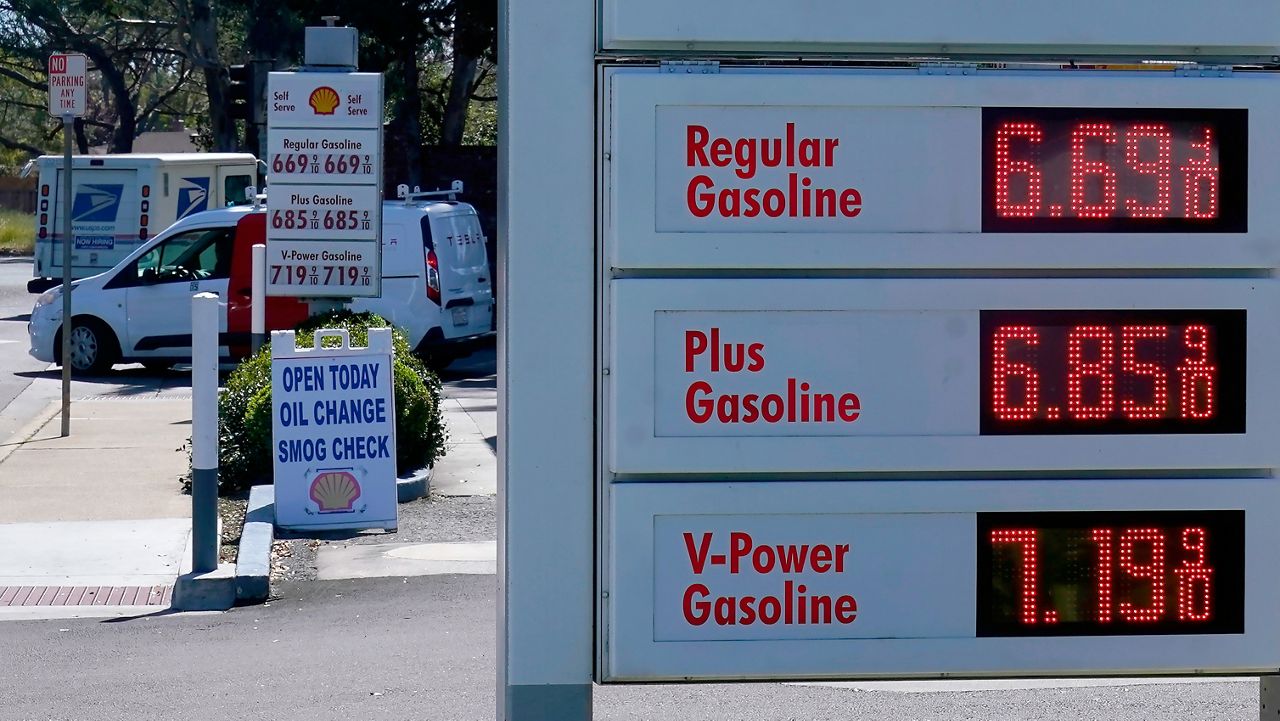Three House Democrats introduced a bill that would give Americans struggling with high gas prices a monthly $100 rebate to help ease the pain at the pump.
Reps. Mike Thompson, D-Calif., John Larson, D-Conn. and Lauren Underwood, D-Ill., last week introduced the Gas Rebate Act of 2022, which would send Americans a $100 per month energy rebate — and $100 for each dependent — for the rest of the year in any month where gas prices exceed $4.00 per gallon.
According to AAA, the national average price for a gallon of regular gas is $4.237 and has steadily fallen since hitting a record-high of $4.331 on March 11 amid Russia’s invasion of Ukraine, which has impacted the price of oil and gas globally.
Prices are down from $4.242 on Tuesday and $4.305 last week, but are much higher than the average price one month ago, $3.535.
“Americans are feeling the impact at the pump of Vladimir Putin’s illegal invasion of Ukraine, and right now we must work together on commonsense policy solutions to ease the financial burden that my constituents are feeling,” Thompson said in a statement.
“The Putin Price Hike is putting strain on our economy, and I am proud to be working with Reps. Larson and Underwood to introduce this legislation to provide middle-class Americans with monthly payments to ease the financial burden of this global crises,” he added.
The rebate follows the same format as the most recent COVID stimulus payments, also known as Economic Impact Payments: Single filers earning less than $75,000 would get the full $100, phased out at $80,000; Joint filers making less than $150,000 annually would also get $100, phasing out at $160,000.
Underwood also recently introduced a bill with Oregon Rep. Peter DeFazio known as the Stop Gas Price Gouging Tax and Rebate Act, which would also provide similar payments for Americans facing high energy costs, but also levies a one-time, 50% windfall profit tax on income that exceeds 110% of their average adjusted taxable income from prior to the pandemic (2015-2019).
“Every day, I hear from my constituents about how rising gas prices are impacting their quality of life,” Underwood said. “They deserve relief, which is why I helped introduce this legislation to put money back in the pockets of families to help them afford rising energy costs while holding greedy oil and gas companies accountable.”
Senate Democrats have also introduced a bill to suspend the federal gas tax, though momentum on the bill has stalled. Maryland and Georgia recently suspended their state gas taxes, and others may follow.
It is unclear whether any of these bills will make it to the floor of the House for a vote, nor is it apparent if they’d be taken up by the Senate, though President Joe Biden and Congressional leaders are ramping up the pressure on Big Oil as gas prices remain high.
In a Twitter post last week, President Joe Biden shared a chart showing crude oil prices falling in recent days while the price of gasoline has remained relatively steady at well over $4 for a gallon of regular fuel.
“Oil prices are decreasing, gas prices should too,” Biden wrote. “Last time oil was $96 a barrel, gas was $3.62 a gallon. Now it’s $4.31. Oil and gas companies shouldn’t pad their profits at the expense of hardworking Americans.”
Senate Majority Leader Chuck Schumer, D-N.Y., said last week he expects Congress to call CEOs from oil and gas companies to testify in the coming weeks on what he described as an "alarming spike in energy prices.”
“The bewildering incongruity between falling oil prices and rising gas prices smacks of price gouging and is deeply damaging to working Americans,” he said on the Senate floor. “The Senate is going to get answers.”
“We've called on [the oil] industry to boost production and stop hoarding profits,” House Speaker Nancy Pelosi, D-Calif., said at a press conference last week, adding: “When the price of oil goes up, the price of gasoline goes up. When the price of oil goes down, the price of gasoline does not necessarily go down. This is not right. It's not fair.”
In a statement emailed to Spectrum News last week, the American Petroleum Institute, the trade group that represents the oil and natural gas industry, said there are valid reasons for a lag between when crude oil prices and gas prices fall.
"On gas prices, the American people are looking for solutions, not finger pointing,” said Frank Macchiarola, API’s senior vice president of policy, economics and regulatory affairs. “Across the economy, retail prices in many industries go down slower than they go up — this isn't a new phenomenon.
“As we've seen in the past, it takes time for changing market conditions to work through the supply chain and for the price of crude oil to be widely reflected in the price we pay at local gas stations, more than 95 percent of which are independently owned small businesses and not operated by oil companies,” Macchiarola added.



